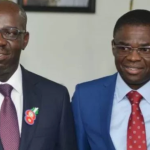
The recent announcement by the newly appointed Minister of the Federal Capital Territory (FCT), Nyesom Wike, regarding the mass demolition of improperly situated houses in the FCT has ignited a wave of mixed reactions within the capital city.
Known for his resolute leadership style, Minister Wike, who assumed office alongside 44 other recently appointed Ministers of the Federal Republic, declared his intent during his inaugural press conference to dismantle structures that violate the Abuja Master-plan and encroach upon green areas in the capital, regardless of property ownership.
Wike’s ambitious demolition plan aims to address the proliferation of illegal and unplanned structures that have marred the cityscape and hindered efforts towards sustainable urban development.
“Those who are distorting the Masterplan of Abuja, will face consequences. If you’ve built where you shouldn’t, it will come down. Whether you’re a Minister or an ambassador, your property will not be spared. Green areas that have been overtaken by development must be reclaimed. If you disregard greenery, you’re disregarding your own well-being,” asserted Minister Wike.
However, this move has sparked considerable backlash from civil society organizations (CSOs), community leaders, activists, and Abuja residents who have voiced their concerns to SATURDAY VANGUARD. They argue that Minister Wike’s focus should be directed towards enhancing essential services such as healthcare, education, and security.
While acknowledging the need to address unauthorized structures, critics emphasize that these efforts should not overshadow the pressing requirement to uplift the living conditions of the city’s inhabitants.
Drawing comparisons to the administrative approach of the former FCT Minister, some Abuja residents cautiously support the idea of removing illegal structures, but advise against disproportionately prioritizing demolition. They call on Wike to strike a balance and correct existing issues while executing his responsibilities as the Minister of the nation’s capital.
Many voices have highlighted the potential ramifications of these demolitions, particularly the displacement of vulnerable residents who are already grappling with economic challenges. Instead of demolishing homes, there are widespread calls for investment in medical facilities, educational institutions, and comprehensive security measures to ensure the well-being of all residents.
Speaking about the dire state of Primary Healthcare Centers (PHCs), Agnes Ibeh, a mother of three and trader, emphasized the urgency of revamping these facilities to serve the needs of the economically disadvantaged. She stated, “Wike must prioritize the overhaul of primary health care centers and public health facilities in Abuja. These facilities are crucial for providing basic healthcare services, especially for those who cannot afford private care.”
Dr. John Ikechukwu, an Abuja-based resident doctor, echoed these sentiments, emphasizing that neglected public health facilities disproportionately affect the underprivileged. “Immediate action is required to address the dismal state of these facilities, ensuring better access to healthcare for the less fortunate,” he stated.
Gloria Adamu, a teacher, emphasized the wider impact of investing in healthcare: “Enhancing primary health care centers and public health facilities is not just about improving the lives of the underserved; it contributes to the overall health of the entire community.”
Community leaders also underscored the necessity of affordable transportation, improved electricity, and rehabilitated markets, urging a comprehensive approach to address the multifaceted challenges faced by the city’s residents.
In the realm of security, Ofido Goodness, an Abuja-based social media influencer, highlighted the complexity of the issue and stressed the need for balanced measures. “If the demolition aims at urban restructuring, people in affected areas should be notified and compensated. However, rising insecurity also demands attention, including increased police presence, surveillance, and effective crime prevention strategies,” she stated.
Amid these debates, the founder of the Coalition of Good Governance, Ahmed Abdullahi, suggested a shift in focus towards essential services like primary healthcare, security, electricity, education, affordable transportation, and market rehabilitation. Other stakeholders echoed similar sentiments, advocating for preserving the city’s foundations while addressing developmental needs.
In response, the Chief of the Lugbe Community, Danlami Shekwozhanyi, proposed alternatives such as regulating illegal structures through a stringent vetting process and imposing penalties on violators instead of resorting to mass demolitions.
Socio-political activist Deji Adeyanju implored Minister Wike to adopt a holistic approach. “While demolitions might be necessary in some cases, investing in healthcare, education, sports facilities, and security measures will lead to a more sustainable and inclusive development strategy,” he said.
As Minister Wike’s mass demolition plan continues to stir controversy, the consensus among various stakeholders is that a well-rounded development approach, prioritizing essential services, can ensure the growth and well-being of Abuja’s residents.





Comments are closed.